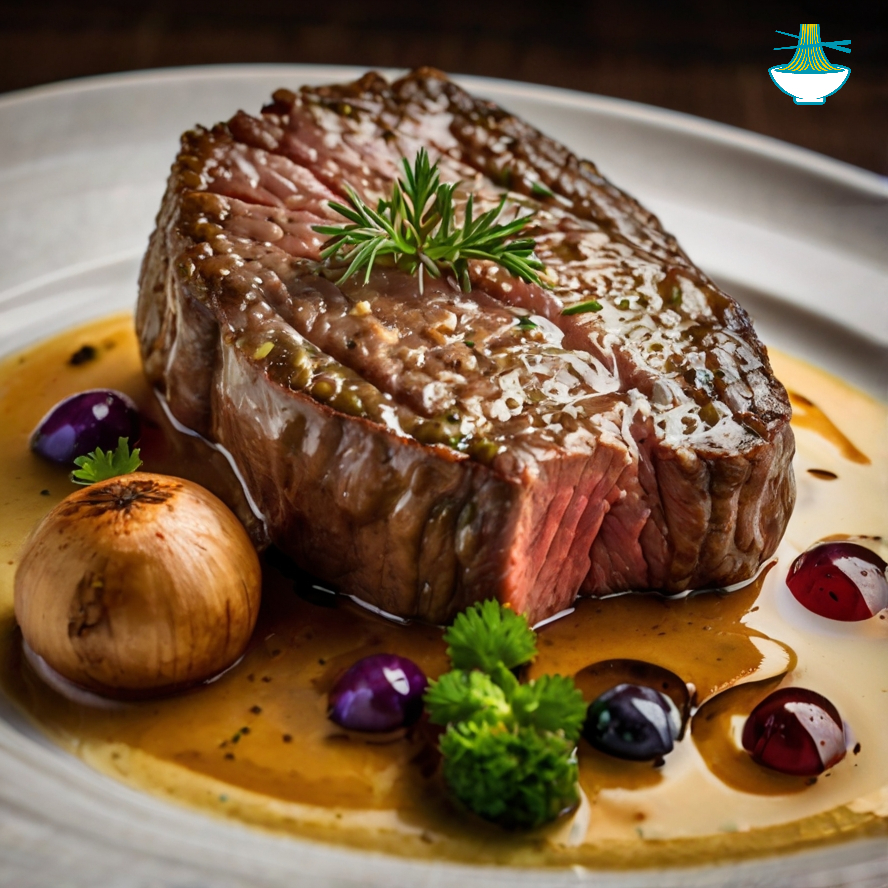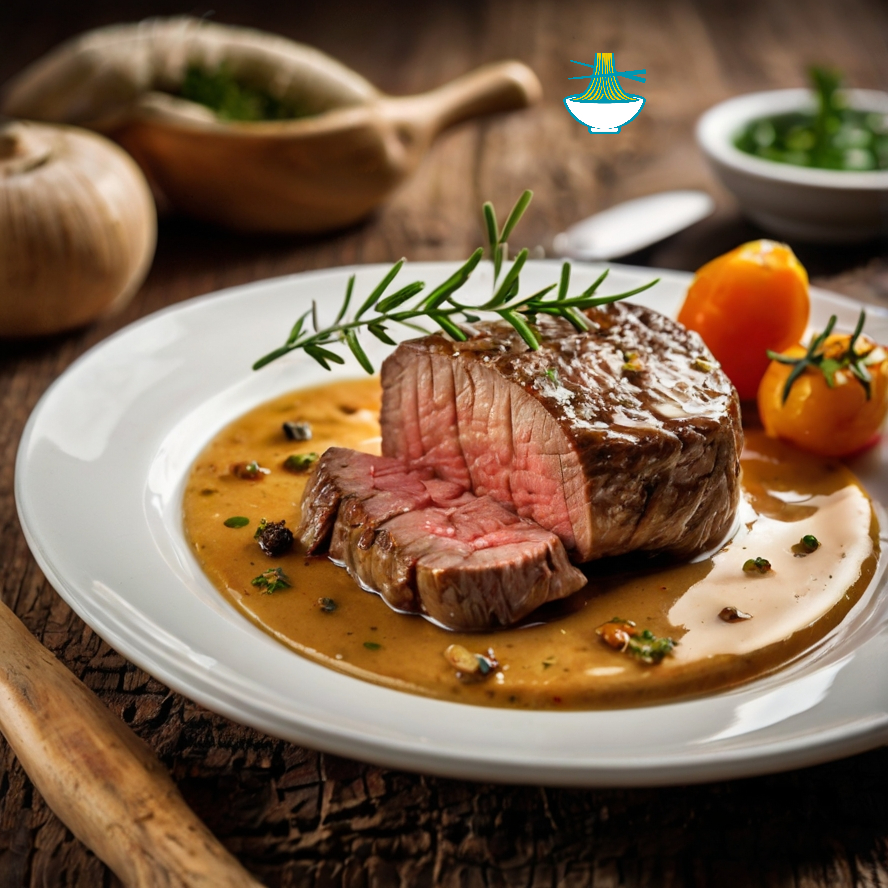Svíčková na smetaně is a cherished Czech dish, renowned for its tender beef sirloin enveloped in a rich, creamy sauce. This traditional meal perfectly captures the essence of Czech cuisine, combining savory flavors with a velvety texture. Often enjoyed during special occasions and family gatherings, Svíčková na smetaně is a true representation of Czech culinary heritage.

Svíčková na smetaně, or "Marinated Sirloin with Cream Sauce," has deep roots in Czech gastronomy. Originating in the 19th century, it gained popularity among the Czech aristocracy, influenced by the Viennese cuisine of the Austro-Hungarian Empire. The dish evolved from the Viennese "Tafelspitz," featuring marinated beef and a creamy sauce. Over time, Svíčková na smetaně became a staple in Czech homes and restaurants, symbolizing festive meals and family traditions. The name "Svíčková" derives from the Czech word for "candle," referring to the cylindrical shape of the beef, while "smetaně" highlights the creamy sauce.
Ingredients:
- 800 grams beef sirloin
- 2 onions
- 2 carrots
- 1 parsley root
- 2 cloves garlic
- 1 lemon
- 2 bay leaves
- 5 whole allspice berries
- Salt and pepper, to taste
- 500 milliliters beef broth
- 250 milliliters heavy cream
- 2 tablespoons flour
- 2 tablespoons vegetable oil
- 2 tablespoons butter
- Sugar, to taste
Instructions:
1. Marinate the Beef:
- Peel and chop 1 onion, 1 carrot, and the parsley root.
- In a bowl, mix chopped vegetables with bay leaves, allspice berries, half lemon juice, salt, and pepper.
- Coat the beef sirloin with the marinade. Cover and refrigerate for at least 6 hours or overnight.
2. Cook the Beef:
- Remove the beef from the marinade and pat dry.
- Heat vegetable oil in a pot over medium-high heat. Sear the beef on all sides until browned.
- Add marinade vegetables, cover, and cook on low for about 2 hours, until tender.
3. Prepare the Sauce:
- Finely chop the remaining onion and mince garlic.
- In a separate pan, melt butter over medium heat. Sauté onion and garlic until translucent.
- Stir in flour and cook for 1 minute to form a roux.
- Gradually add beef broth, stirring continuously.
- Add the remaining carrot, sliced, and a pinch of sugar. Simmer for 15 minutes, until carrots are tender.
- Strain the sauce to remove solids. Stir in heavy cream and remaining lemon juice. Season with salt and pepper.
4. Assemble the Dish:
- Remove the beef from the pot, let rest, and slice thinly.
- Arrange beef on a platter and pour sauce over it.
- Serve with traditional Czech side dishes like bread dumplings or potato dumplings. Garnish with lemon slices, cranberry sauce, and optional whipped cream.
Note: Svíčková na smetaně is traditionally accompanied by cranberry sauce and whipped cream. The cranberry sauce adds a tart contrast to the rich sauce, while the whipped cream provides a touch of sweetness. A lemon slice adds a fresh, zesty finish.

Nutrition Value:
1. Beef Sirloin (800 grams)
- Calories: 1,760 kcal
- Carbohydrates: 0 g
- Protein: 176 g
- Fat: 120 g
- Sodium: 280 mg
- Cholesterol: 580 mg
- Vitamins: Rich in B vitamins, especially B12 and niacin.
- Minerals: High in iron, zinc, and phosphorus.
- Nutritional Benefit: Beef sirloin is a high-quality source of protein and essential nutrients like iron, which is vital for oxygen transport in the blood, and zinc, which supports immune function.
2. Onions (2 medium)
- Calories: 92 kcal
- Carbohydrates: 22 g
- Protein: 2 g
- Fat: 0 g
- Sodium: 6 mg
- Cholesterol: 0 mg
- Vitamins: Good source of vitamin C and B vitamins, especially B6.
- Minerals: Contains potassium and manganese.
- Nutritional Benefit: Onions have antioxidants and anti-inflammatory properties, supporting heart health and helping to reduce the risk of certain cancers.
3. Carrots (2 medium)
- Calories: 50 kcal
- Carbohydrates: 12 g
- Protein: 1 g
- Fat: 0 g
- Sodium: 70 mg
- Cholesterol: 0 mg
- Vitamins: High in vitamin A (beta-carotene) and vitamin K.
- Minerals: Contains potassium and calcium.
- Nutritional Benefit: Carrots are excellent for eye health due to their high beta-carotene content, and they also support immune function and skin health.
4. Parsley Root (1 medium)
- Calories: 45 kcal
- Carbohydrates: 11 g
- Protein: 1 g
- Fat: 0 g
- Sodium: 30 mg
- Cholesterol: 0 mg
- Vitamins: Rich in vitamins A, C, and K.
- Minerals: Contains potassium, calcium, and magnesium.
- Nutritional Benefit: Parsley root aids in digestion and provides essential nutrients like vitamin K, which is important for bone health and blood clotting.
5. Garlic (2 cloves)
- Calories: 9 kcal
- Carbohydrates: 2 g
- Protein: 0 g
- Fat: 0 g
- Sodium: 1 mg
- Cholesterol: 0 mg
- Vitamins: Contains small amounts of vitamins B6 and C.
- Minerals: Provides manganese and calcium.
- Nutritional Benefit: Garlic has antimicrobial and anti-inflammatory properties, supports heart health, and may help regulate blood sugar levels.
6. Lemon (1 medium)
- Calories: 17 kcal
- Carbohydrates: 5 g
- Protein: 0 g
- Fat: 0 g
- Sodium: 1 mg
- Cholesterol: 0 mg
- Vitamins: High in vitamin C.
- Minerals: Contains potassium and magnesium.
- Nutritional Benefit: Lemons are rich in vitamin C, which boosts the immune system and improves skin health. They also aid in digestion and have antioxidant properties.
7. Bay Leaves (2 leaves)
- Calories: 5 kcal
- Carbohydrates: 1 g
- Protein: 0 g
- Fat: 0 g
- Sodium: 0 mg
- Cholesterol: 0 mg
- Vitamins: Contains vitamin A and small amounts of vitamin C.
- Minerals: Provides iron and calcium.
- Nutritional Benefit: Bay leaves have anti-inflammatory and digestive benefits and can enhance the flavor of dishes with minimal calories.
8. Allspice Berries (5 whole)
- Calories: 5 kcal
- Carbohydrates: 1 g
- Protein: 0 g
- Fat: 0 g
- Sodium: 0 mg
- Cholesterol: 0 mg
- Vitamins: Contains vitamin C and small amounts of B vitamins.
- Minerals: Provides iron and manganese.
- Nutritional Benefit: Allspice has antioxidant properties and can aid in digestion and reduce inflammation.
9. Salt (to taste)
- Calories: 0 kcal
- Carbohydrates: 0 g
- Protein: 0 g
- Fat: 0 g
- Sodium: 2,300 mg (per teaspoon)
- Cholesterol: 0 mg
- Vitamins: None
- Minerals: Sodium.
- Nutritional Benefit: Salt enhances flavor but should be used in moderation to manage sodium intake and prevent health issues like hypertension.
10. Pepper (to taste)
- Calories: 6 kcal
- Carbohydrates: 2 g
- Protein: 0 g
- Fat: 0 g
- Sodium: 0 mg
- Cholesterol: 0 mg
- Vitamins: Contains vitamin K and small amounts of vitamin C.
- Minerals: Provides iron and manganese.
- Nutritional Benefit: Pepper contains piperine, which can aid in digestion and improve nutrient absorption.
11. Beef Broth (500 milliliters)
- Calories: 35 kcal
- Carbohydrates: 1 g
- Protein: 7 g
- Fat: 1 g
- Sodium: 1,000 mg
- Cholesterol: 20 mg
- Vitamins: Contains small amounts of vitamins B12 and C.
- Minerals: Provides sodium, potassium, and phosphorus.
- Nutritional Benefit: Beef broth is a source of collagen, which supports joint health and may improve skin elasticity.
12. Heavy Cream (250 milliliters)
- Calories: 1,000 kcal
- Carbohydrates: 8 g
- Protein: 5 g
- Fat: 85 g
- Sodium: 80 mg
- Cholesterol: 250 mg
- Vitamins: Contains vitamins A and D.
- Minerals: Provides calcium and phosphorus.
- Nutritional Benefit: Heavy cream adds richness and creaminess to dishes. It is high in fat and calories, so it should be used in moderation.
13. Flour (2 tablespoons)
- Calories: 60 kcal
- Carbohydrates: 13 g
- Protein: 2 g
- Fat: 0 g
- Sodium: 0 mg
- Cholesterol: 0 mg
- Vitamins: Contains small amounts of B vitamins.
- Minerals: Provides iron and calcium.
- Nutritional Benefit: Flour acts as a thickening agent for sauces and soups, but it is low in nutrients compared to whole grains.
14. Vegetable Oil (2 tablespoons)
- Calories: 240 kcal
- Carbohydrates: 0 g
- Protein: 0 g
- Fat: 28 g
- Sodium: 0 mg
- Cholesterol: 0 mg
- Vitamins: Contains vitamin E.
- Minerals: Provides small amounts of iron.
- Nutritional Benefit: Vegetable oil is a source of healthy fats and vitamin E but should be used in moderation due to its high caloric content.
15. Butter (2 tablespoons)
- Calories: 200 kcal
- Carbohydrates: 0 g
- Protein: 0 g
- Fat: 22 g
- Sodium: 180 mg
- Cholesterol: 60 mg
- Vitamins: Rich in vitamins A and D.
- Minerals: Provides calcium and phosphorus.
- Nutritional Benefit: Butter adds flavor and richness but is high in saturated fats and cholesterol, so it should be used sparingly.
16. Sugar (to taste)
- Calories: 16 kcal (per teaspoon)
- Carbohydrates: 4 g
- Protein: 0 g
- Fat: 0 g
- Sodium: 0 mg
- Cholesterol: 0 mg
- Vitamins: None
- Minerals: None
- Nutritional Benefit: Sugar adds sweetness but lacks essential nutrients. Excessive consumption can contribute to health issues like obesity and diabetes.
Note: Nutritional values are approximate and can vary based on the specific brands and quantities used.


Comments